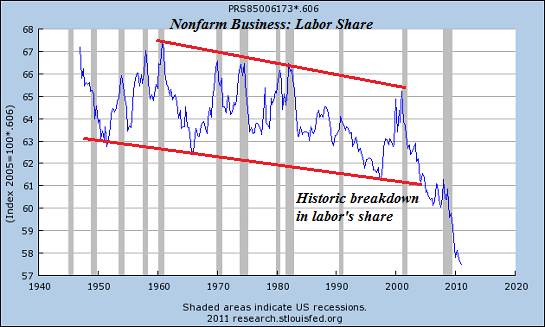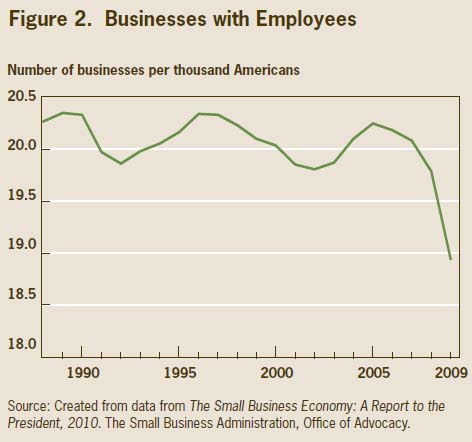Sorry, Fed Inflationistas: Technology Is Deflationary
Technology, like Nature itself, has no emotional stake in what is creatively destroyed.
We all know the Federal Reserve is terrified of deflation, because they keep telling us that deflation is the equivalent of death and inflation is the equivalent of oxygen. What they fail to mention is that inflation is only oxygen for debtors barely able to service their debt and those who profit from debt, i.e. bankers and financiers.
For everyone earning a wage or salary, inflation is the equivalent of death by a thousand cuts and deflation is the elixir of life. When prices decline, our money goes further, i.e. our purchasing power increases.
Only bankers, governments and other parasites that live off the carrion of debt fear deflation and try to destroy the purchasing power of wages with everything in their power. The irony of all the parasites pushing inflation as the cure-all is the only real cure-all to our present stagnation and decline is the complete renunciation/write-off of unpayable debts, a systemic bankruptcy that rights the ship of state and the economy by writing off bad debt and blowing off phantom collateral, i.e. assets that are supporting debt whose valuations have been pushed to the moon by easy-money and low interest rates.
Let's start our discussion of technology and deflation by asking one question: has there ever been a central authority that tried to stop the spread of technology and won?Not to my knowledge; new technologies that offer enormous benefits (think affordable eyeglasses) and astounding reductions in cost spread like wildfire, even when central banks and states are dead-set on suppressing their creative destruction of Status Quo vested interests.
Sorry to bring the bad news, Fed inflationistas, but technology is irrevocably deflationary. The exceptions are: regulations that require additional technology to benefit life safety, and entrenched interests that erect barriers to competition and new technology, for example, Big Pharma and the sickcare industry.
When state-protected cartels rule the roost, costs go up no matter how much new technology is introduced. State-protected monopolies (sickcare, higher education, etc.) can suppress disruptive technologies, at least for a while, until their bloated, high-cost, diminishing-return structure collapses under its own weight.
Obamacare is a Catastrophe That Cannot Be Fixed (December 6, 2013)
The real unsubsidized cost of Obamacare for two healthy adults ($23,244 annually) exceeds the cost of rent or a mortgage for the vast majority of Americans. Please ponder this for a moment: buying healthcare insurance under Obamacare costs as much or more as buying a house.
The Orwellian Affordable Care Act will not last, because it is intrinsically unaffordable, wasteful and inefficient. Only those whose care is paid by others via subsidies think it affordable; on a systemic level, it is doomed to implode, and the sooner the better in terms of enabling technology to creatively destroy vested interests.
Technology is enormously deflationary on a number of fronts.
1. Perhaps most importantly, technology eliminates costly human labor. In the late 19th century, roughly 50% of the labor force worked on farms. Today, the number is 2% of the workforce.
At the turn of the 19th century, the largest category of employment was domestic help. The rise of electrical appliances and machines of convenience eliminated much of the need for domestic labor.
The next sector to undergo large-scale destruction of jobs was manufacturing. The process of replacing human labor with robots and software automation in factories is still underway.
Advances in software are now eliminating white-collar office jobs and retail employment. People like me (self-employed information workers) can now produce output and manage services that required three to five people a mere 25 years ago.
Although many believe new technologies create more jobs than they eliminate, there is precious little evidence of that today. Anyone who thinks biotech is going to create millions of new jobs needs to survey the job market for PhDs and those with Masters degrees in biotech fields--biochemistry, etc. The job market is tight, not expansive; these high-tech sectors can only absorb so many graduates, regardless of their level of training.
Just issuing diplomas does not create jobs for graduates.
As technology eliminates millions of jobs by replacing human labor, wages decline and the percentage of national income that goes to labor also declines. This means there is less money for consumption, pressuring prices of consumer goods. This is broadly deflationary.
Here is labor's share of income:

The bedrock of employment, small business, has cratered:

The wholesale elimination of white-collar labor has barely started.
2. Technology consolidates rentier services via convergence. A few years ago everyone needed a landline telephone, a separate phone line for a modem, a television, a DVD player, a mobile phone, a stereo system and a laptop computer. Now all anyone under the age of 30 needs is a smart-phone and perhaps a cheap laptop or tablet.
The rentier skims being eliminated by convergence are significant. Now people can get rid of cable or satellite and watch most programming via the web.
3. Technology gets cheaper. The first sequencing of the human genome cost hundreds of millions of dollars. Now it's down to a few hundred dollars per sequencing. An Android tablet with full functionality can be had for $40 wholesale in China.
As competition drives prices down, profits erode. This is why the ideal set-up for profits has always been monopoly. But technology has a way of disrupting monopolies.
4. Technology enables transparency and thus lower prices. Transparency is anathema to cartels, which is why the actual cost of healthcare is obscured by providers desperate to avoid competition. But the web is introducing transparency and that alone is disrupting and creatively destroying profits based on information asymmetry.
5. Technology improves efficiency and reduces consumption. Volkswagen's 283-mile-per-gallon car is currently very costly, but how long will it take for those technologies to spread to the mainstream? How much less fuel will a 140-mile-per-gallon vehicle burn than a current generation car?
Reduced consumption means reduced sales and profits.
6. Profits go down as creative destruction takes down profitable rentier skims, cartels and bloated, inefficient industries. And what happens when profits decline for systemic reasons? Stock market valuations based on absurdly optimistic expectations of future profits implode along with profits.
And when the stock market finally reflects declining sales and profits, even the Fed won't be able to prop it up.
Technology, like Nature itself, has no emotional stake in what is creatively destroyed. Technology had no attachment to lamplighters or buggy-whip manufacturers, and it has no attachment to the Fed, sickcare, higher education, manufacturing or the state itself, all of which are being remorselessly disrupted.
As Bob Dylan put it, he not busy being born is busy dying. That is equally true for enterprises, industries and institutions.
Get a Job, Build a Real Career and Defy a Bewildering Economy(Kindle, $9.95)(print, $20)

Are you like me? Ever since my first summer job decades ago, I've been chasing financial security. Not win-the-lottery, Bill Gates riches (although it would be nice!), but simply a feeling of financial control. I want my financial worries to if not disappear at least be manageable and comprehensible.
And like most of you, the way I've moved toward my goal has always hinged not just on having a job but a career.
You don't have to be a financial blogger to know that "having a job" and "having a career" do not mean the same thing today as they did when I first started swinging a hammer for a paycheck.
Even the basic concept "getting a job" has changed so radically that jobs--getting and keeping them, and the perceived lack of them--is the number one financial topic among friends, family and for that matter, complete strangers.
So I sat down and wrote this book: Get a Job, Build a Real Career and Defy a Bewildering Economy.
It details everything I've verified about employment and the economy, and lays out an action plan to get you employed.
I am proud of this book. It is the culmination of both my practical work experiences and my financial analysis, and it is a useful, practical, and clarifying read.
Test drive the first section and see for yourself. Kindle, $9.95 print, $20
| Thank you, Jonathan F. ($50), for your monumentally generous contribution to this site -- I am greatly honored by your support and readership. | Thank you,Stephen M. ($50), for your marvelously generous contribution to this site -- I am greatly honored by your support and readership. |



























